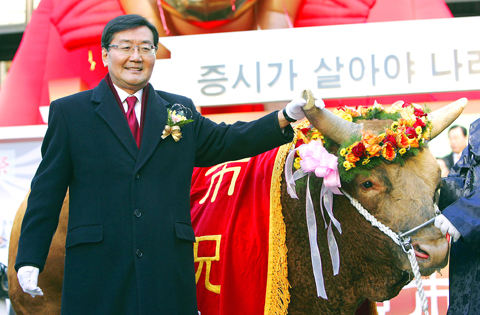Singapore’s economy could contract by as much as 2 percent this year, the government said yesterday after data showed a deepening recession in the trade-dependent economy.
The forecast marks a downgrade from the government’s previous estimate, made in November, which ranged between a contraction of 1 percent and expansion of 2 percent this year.
“The global economic crisis has worsened since November, with sharp declines in global demand, trade and investments,” the Ministry of Trade and Industry said in a news release.

PHOTO: EPA
It also cited a sharp fourth-quarter contraction in the Singapore economy for the weaker forecast.
Singapore in October became the first Asian economy to enter recession, but since then major economies around the world — including the city state’s key export markets the EU and US — have also seen declining economic activity.
Singapore is Southeast Asia’s wealthiest economy in terms of GDP per capita, but its heavy dependence on trade makes it sensitive to economic disturbances in developed economies.
On a seasonally adjusted annualized quarter-on-quarter basis, real GDP fell by 12.5 percent in the fourth quarter last year, compared with a decline of 5.4 percent in the third quarter, the trade ministry said. In the second quarter last year, the economy fell by 5.7 percent.
Measured against the fourth quarter the previous year, the economy contracted by 2.6 percent in real terms, after a 0.3 percent year-on-year fall in the third quarter.
GDP is the value of all goods and services produced by an economy.
The fourth-quarter figures are advance estimates based largely on October and November figures. More detailed information is to be released next month.
In his New Year’s Day message to the nation on Wednesday, Singaporean Prime Minister Lee Hsien Loong (李顯龍) warned the economy was likely to worsen this year after growing just 1.5 percent last year.
The performance was below the last official forecast of 2.5 percent growth, after earlier downgrades in last year’s growth outlook were made during the year.
In 2007, the economy grew by 7.7 percent, the trade ministry said.
“Our economy will probably contract further. More companies will be forced to downsize. So far we have not seen many job losses, but I expect more retrenchments in the next few months. We must be psychologically prepared,” the prime minister said.
“As a small, open economy, Singapore cannot avoid being hit. We earn our living by trading with and servicing the world. So the fall in worldwide demand has hit our exports, our tourism sector and our broader economy. We must therefore prepare for a difficult year ahead and especially the first half of 2009,” he said.

WAITING GAME: The US has so far only offered a ‘best rate tariff,’ which officials assume is about 15 percent, the same as Japan, a person familiar with the matter said Taiwan and the US have completed “technical consultations” regarding tariffs and a finalized rate is expected to be released soon, Executive Yuan spokeswoman Michelle Lee (李慧芝) told a news conference yesterday, as a 90-day pause on US President Donald Trump’s “reciprocal” tariffs is set to expire today. The two countries have reached a “certain degree of consensus” on issues such as tariffs, nontariff trade barriers, trade facilitation, supply chain resilience and economic security, Lee said. They also discussed opportunities for cooperation, investment and procurement, she said. A joint statement is still being negotiated and would be released once the US government has made

NEW GEAR: On top of the new Tien Kung IV air defense missiles, the military is expected to place orders for a new combat vehicle next year for delivery in 2028 Mass production of Tien Kung IV (Sky Bow IV) missiles is expected to start next year, with plans to order 122 pods, the Ministry of National Defense’s (MND) latest list of regulated military material showed. The document said that the armed forces would obtain 46 pods of the air defense missiles next year and 76 pods the year after that. The Tien Kung IV is designed to intercept cruise missiles and ballistic missiles to an altitude of 70km, compared with the 60km maximum altitude achieved by the Missile Segment Enhancement variant of PAC-3 systems. A defense source said yesterday that the number of

‘CRUDE’: The potential countermeasure is in response to South Africa renaming Taiwan’s representative offices and the insistence that it move out of Pretoria Taiwan is considering banning exports of semiconductors to South Africa after the latter unilaterally downgraded and changed the names of Taiwan’s two representative offices, the Ministry of Foreign Affairs (MOFA) said yesterday. On Monday last week, the South African Department of International Relations and Cooperation unilaterally released a statement saying that, as of April 1, the Taipei Liaison Offices in Pretoria and Cape Town had been renamed the “Taipei Commercial Office in Johannesburg” and the “Taipei Commercial Office in Cape Town.” Citing UN General Assembly Resolution 2758, it said that South Africa “recognizes the People’s Republic of China (PRC) as the sole

Taiwanese exports to the US are to be subject to a 20 percent tariff starting on Thursday next week, according to an executive order signed by US President Donald Trump yesterday. The 20 percent levy was the same as the tariffs imposed on Vietnam, Sri Lanka and Bangladesh by Trump. It was higher than the tariffs imposed on Japan, South Korea and the EU (15 percent), as well as those on the Philippines (19 percent). A Taiwan official with knowledge of the matter said it is a "phased" tariff rate, and negotiations would continue. "Once negotiations conclude, Taiwan will obtain a better